Health
Cancer centers are suffering major shortage of popular chemo drugs
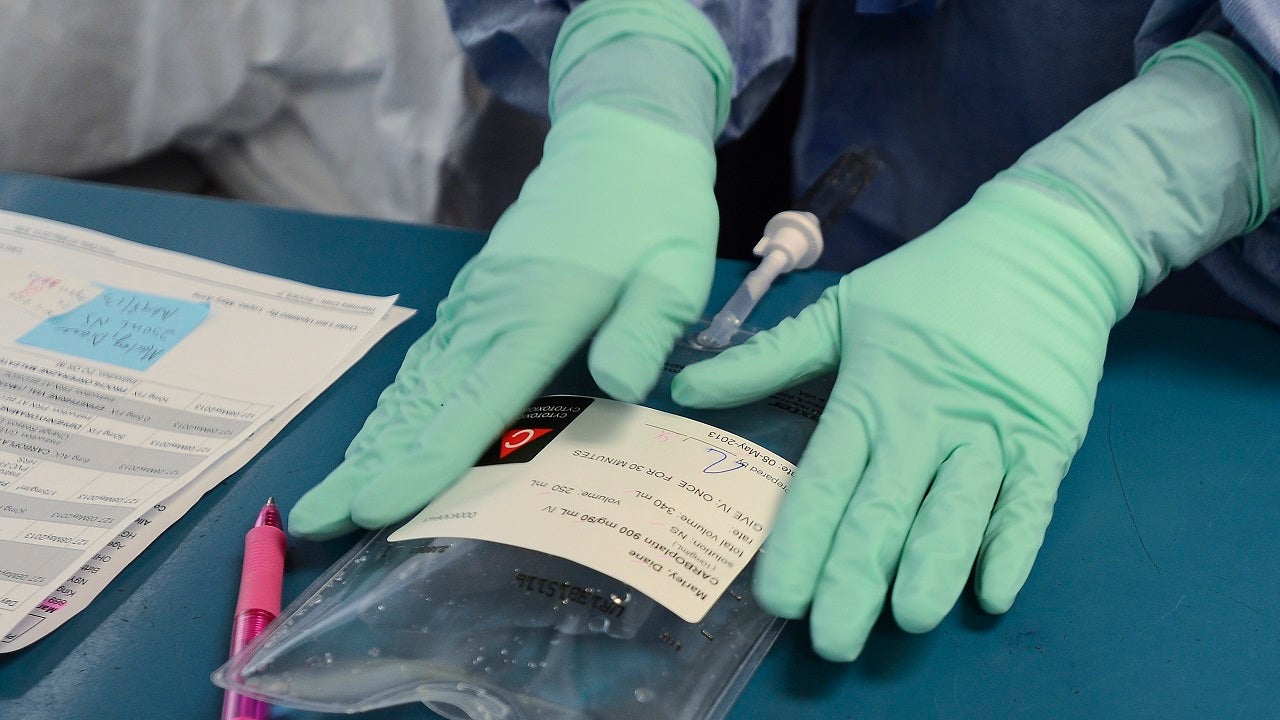
CHARLOTTE, N.C. – Common cancer drugs are running short due to ongoing supply chain issues, forcing doctors to make tough decisions about treating patients., a new survey shows
The National Comprehensive Cancer Network (NCCN) says 90% of cancer centers in the U.S. are affected by shortages of two main drugs.
Doctors say this isn’t the first chemo shortage they’ve dealt with, but it might be one of the toughest ones yet.
“Some of the facilities in the United States, we understand, actually have no Carboplatin or Cisplatin available,” said Dr. Robert W. Carlson, the CEO of the NCCN.
CARBOPLATIN, CISPLATIN DRUG SHORTAGES IMPACTING TREATMENT OF US CANCER PATIENTS: ‘UNACCEPTABLE SITUATION’
Gail Lass needed Carboplatin, but her doctor didn’t have any and wasn’t sure if he’d be able to find it elsewhere. (Fox News)
Carlson says Carboplatin and Cisplatin are two of the most common chemotherapy medications as they treat many types of cancer, like lung and testicular cancer.
But, right now, not every patient has easy access to them.
“I was worried, because I didn’t want this to be prolonged,” said Gail Lass, who is being treated for stage 2 lung cancer in Charlotte, North Carolina.
Lass needed Carboplatin, but her doctor didn’t have any and wasn’t sure if he’d be able to find it elsewhere. Eventually, her doctor arranged for her to get the chemo at a nearby hospital.
TWO NEW CANCER PILLS SHOW ‘UNPRECEDENTED’ RESULTS IN BOOSTING SURVIVAL RATES AND PREVENTING RECURRENCE
“Usually, one of us can get the drug, but it’s just become more of a challenge,” said Dr. Justin Favaro, a Hematologist and Oncologist at Oncology Specialists of Charlotte.
For now, Favaro says the drugs are being given to people with stage 1, 2 or 3 cancer. That’s because treatment aims to cure the cancer in those stages. Stage 4 is when other treatment options are considered.
“In stage 4, patients where they’re not necessarily curable. A small change of one drug or one regimen to another wouldn’t necessarily shorten their lifespan,” Favaro said. It would just be not necessarily the ideal treatment that we would typically use.”
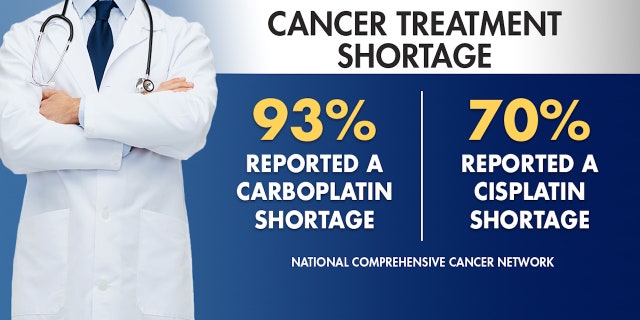
A National Comprehensive Cancer Network survey of 27 U.S. cancer centers shows 93% have reported a shortage of Carboplatin, and 70% reported a shortage of Cisplatin. (Fox News)
It’s estimated that Cisplatin and other similar platinum-based drugs are prescribed for an estimated 10% to 20% of all cancer patients, according to the National Cancer Institute.
“It’s going to get worse before it gets better,” Carlson predicted.
DRUG SHORTAGES IN CANCER, ASTHMA, TRANSPLANT, BACTERIAL INFECTION TREATMENTS
An NCCN survey of 27 U.S. cancer centers shows 93% have reported a shortage of Carboplatin, and 70% reported a shortage of Cisplatin.
“The current estimates are that up to 500,000 cancer patients per year could be affected by the shortage of these two agents,” Carlson said.
The U.S. Food and Drug Administration recently said it would work with a Chinese drugmaker to import Cisplatin to boost the supply for now.
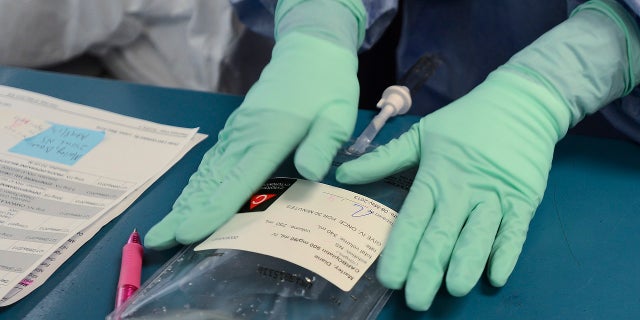
Registered Pharmacy Technician Dawn Deslippe labels a dosage of Carboplatin for a cancer patient receiving treatment at Windsor Regional Hospital in Ontario, just across the border from Detroit, Michigan. (Richard Lautens/Toronto Star via Getty Images)
“The FDA recognizes the potential impact that lack of availability of certain products may have on health care providers and patients,” the FDA said in a statement to Fox News.
“While the agency does not manufacturer drugs and cannot require a pharmaceutical company to make a drug, make more of a drug, or change the distribution of a drug, the public should rest assured the FDA is working closely with numerous manufacturers and others in the supply chain to understand, mitigate and prevent or reduce the impact of intermittent or reduced availability of certain products.”
Dr. Carlson says it’s tough to know when conditions will improve.

Health
Paleo and Atkins Diets: Low-Carb for Different Reasons | Woman's World

Sign Up
Create a free account to access exclusive content, play games, solve puzzles, test your pop-culture knowledge and receive special offers.
Already have an account? Login
Forgot your password?
Get back to the Sign In
Use left and right arrow keys to navigate between menu items.
Use escape to exit the menu.
Health
7 important health stories this week you simply can't miss
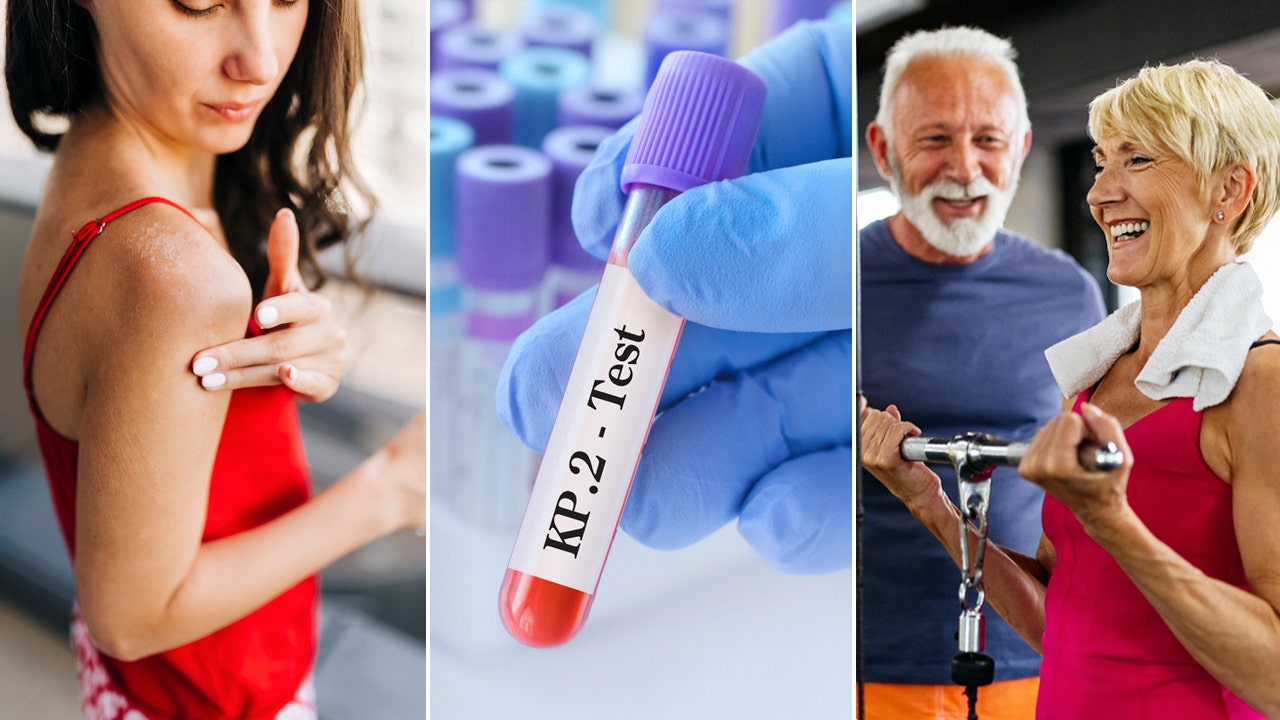
Every day of the week, Fox News Digital publishes a range of health and wellness pieces to keep you up-to-date on medical research, new medications, mental health trends, success stories and more.
In case you missed them, here are a few of the biggest health stories from the past week.
As always, you can see a full list of recent health pieces at http://www.foxnews/health.
CLICK HERE TO SIGN UP FOR OUR HEALTH NEWSLETTER
1. FDA tells COVID vaccine makers to update their fall shots
The U.S. Food and Drug Administration recommended that COVID vaccine manufacturers update their formulas for fall doses, in an attempt to target the KP.2 strain of the JN.1 variant.
Dr. Marc Siegel shared insights on the risks as this variant grows more prominent. Click here to get the story.
“It makes sense to target the KP.2 strain because it is becoming the predominant strain — it is surging in California and will spread across the country,” Siegel told Fox News Digital. (iStock)
2. Expert offers 7 tips to soothe sunburned skin
If not treated properly, sunburn can lead to severe skin damage and increase the risk of skin cancer, experts warn.
Angela Rosoff, a San Francisco-based wellness and beauty expert, shared some proven remedies to treat sun-damaged skin. Click here to get the story.

More than one out of every three adults experienced a sunburn last year, according to a survey by the American Academy of Dermatology. (iStock)
3. Tiger mosquitoes blamed for spread of dengue fever
As dengue fever continues to spread throughout Europe, experts are naming an invasive mosquito species as the culprit.
CANCER NEARLY TOOK HIS LEG, BUT NEW JERSEY FATHER OF 6 WALKS AGAIN: ‘I SHOULDN’T BE HERE’
Infectious diseases experts weighed in on the level of risk and share prevention tips. Click here to get the story.
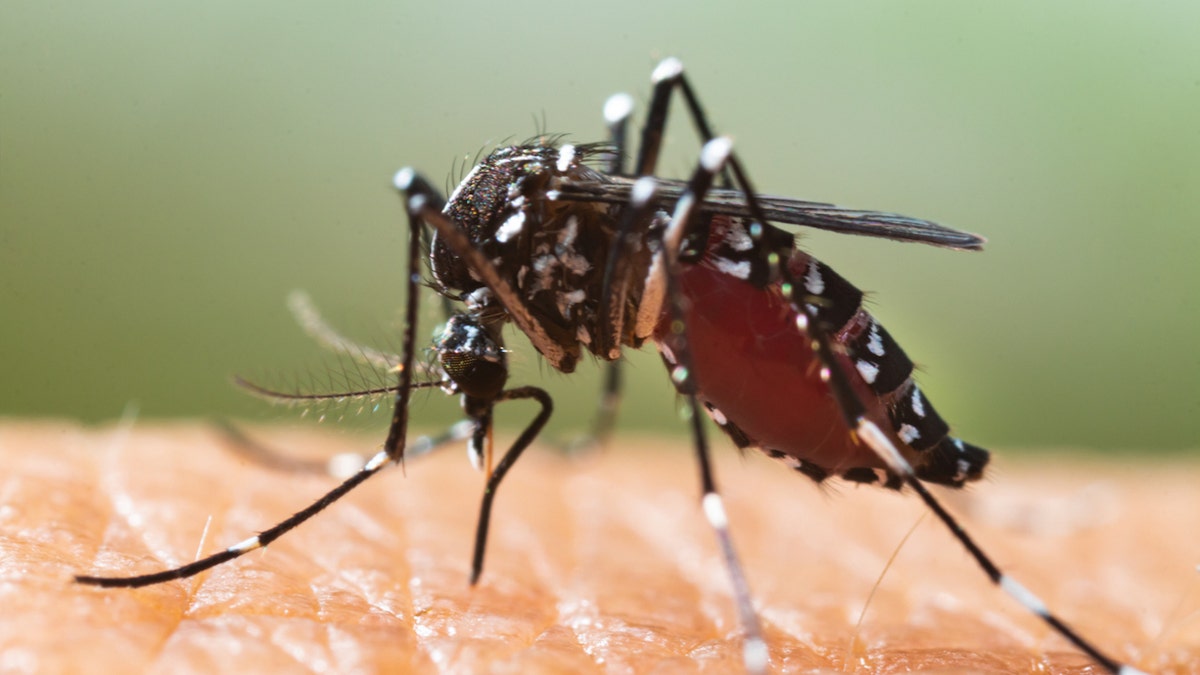
Tiger mosquitoes — the species Aedes albopictus — have spread into 13 EU countries, according to an alert from the European Centre for Disease Prevention and Control. (iStock)
4. Certain exercises could reverse Alzheimer’s, expert says
In her new book, “Reversing Alzheimer’s,” Dr. Heather Sandison, a renowned expert in dementia care, offered specific recommendations for the types of exercise that can benefit patients living with the disease.
“Exercise benefits several of the root causes of neurological disease,” she wrote. Click here to get the story.
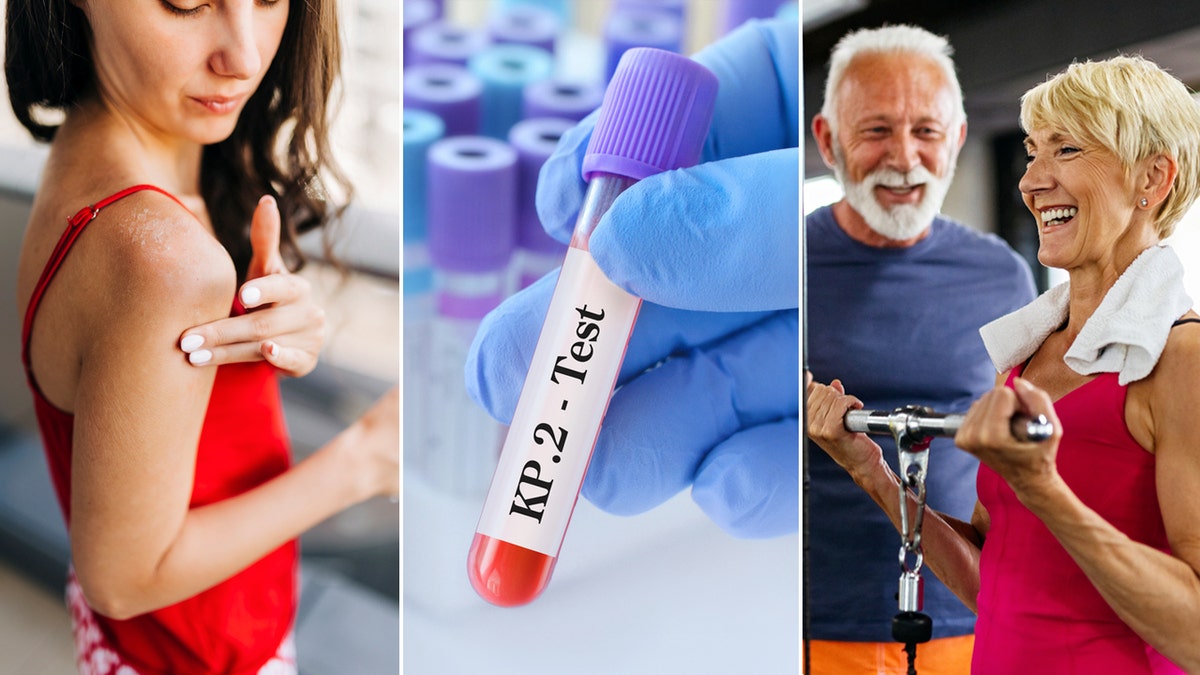
Sunburn remedies, new COVID vaccines, anti-Alzheimer’s exercises and more important stories are covered here. (iStock)
5. Experts bust sunscreen myths
Some claims on social media about sun safety have led to a major misconception that sunscreen could cause skin cancer.
Dermatologists debunk these potentially dangerous myths. Click here to get the story.

Thirty-two percent of Americans believe that a tan makes people look better and healthier, according to the Orlando Health Cancer Institute study. (iStock)
6. New Alzheimer’s drug gets thumbs-up from FDA advisory committee
Donanemab, designed to treat mild cognitive impairment and other symptoms of early Alzheimer’s disease, was endorsed by a U.S. Food and Drug Administration advisory panel.
Here’s what that could mean for patients. Click here to get the story.

Eli Lilly officials presented clinical trial results showing that the drug, donanemab, slowed cognitive and functional decline for people with mild cognitive impairment due to early stages of Alzheimer’s. (iStock)
7. FDA panel rejects MDMA-assisted therapies for PTSD
Many veterans’ hopes were dashed when an FDA advisory committee voted against the overall benefits of MDMA when used to treat PTSD.
Advocates and doctors discussed what this means for the future of psychedelic treatments. Click here to get the story.

“When I heard the verdict, all I could think about was the hopes of those veterans being dashed … and not having a solution for them,” one advocate said. (iStock)
Health
Better Than Ozempic? Doctors Say These Medications Are Better for Weight Loss Than the Popular Semaglutide

Sign Up
Create a free account to access exclusive content, play games, solve puzzles, test your pop-culture knowledge and receive special offers.
Already have an account? Login
Forgot your password?
Get back to the Sign In
Use left and right arrow keys to navigate between menu items.
Use escape to exit the menu.
-

 News1 week ago
News1 week agoIsrael used a U.S.-made bomb in a deadly U.N. school strike in Gaza
-

 World1 week ago
World1 week agoFrance to provide Ukraine with its Mirage combat aircraft
-

 News1 week ago
News1 week agoNonprofit CFO Accused of 'Simply Astonishing' Fraud
-

 World1 week ago
World1 week agoRussia-Ukraine war: List of key events, day 833
-

 Politics1 week ago
Politics1 week agoGeorge Clooney called White House to complain about Biden’s criticism of ICC and defend wife’s work: report
-

 Politics1 week ago
Politics1 week agoNewson, Dem leaders try to negotiate Prop 47 reform off California ballots, as GOP wants to let voters decide
-

 World1 week ago
World1 week ago‘Bloody policies’: Bodies of 11 refugees and migrants recovered off Libya
-

 Politics1 week ago
Politics1 week agoEmbattled Biden border order loaded with loopholes 'to drive a truck through': critics















